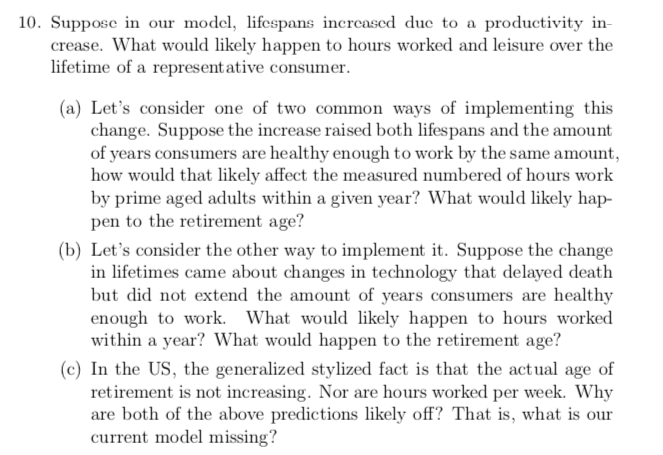10. Suppose in our model, lifespans increased due to a productivity in- crease. What would likely happen to hours worked and leisure over the lifetime of a represent ative consumer. (a) Let's consider one of two common ways of implementing this change. Suppose the increase raised both lifespans and the amount of years consumers are healthy enough to work by the same amount, how would that likely affect the measured numbered of hours work by prime aged adults within a given year? What would likely hap- pen to the retirement age? (b) Let's consider the other way to implement it. Suppose the change in lifetimes came about changes in technology that delayed death but did not extend the amount of years consumers are healthy enough to work. What would likely happen to hours worked within a year? What would happen to the retirement age? (c) In the US, the generalized stylized fact is that the actual age of retirement is not increasing. Nor are hours worked per week. Why are both of the above predictions likely off? That is, what is our current model missing?
10. Suppose in our model, lifespans increased due to a productivity in- crease. What would likely happen to hours worked and leisure over the lifetime of a represent ative consumer. (a) Let's consider one of two common ways of implementing this change. Suppose the increase raised both lifespans and the amount of years consumers are healthy enough to work by the same amount, how would that likely affect the measured numbered of hours work by prime aged adults within a given year? What would likely hap- pen to the retirement age? (b) Let's consider the other way to implement it. Suppose the change in lifetimes came about changes in technology that delayed death but did not extend the amount of years consumers are healthy enough to work. What would likely happen to hours worked within a year? What would happen to the retirement age? (c) In the US, the generalized stylized fact is that the actual age of retirement is not increasing. Nor are hours worked per week. Why are both of the above predictions likely off? That is, what is our current model missing?
Principles of Economics 2e
2nd Edition
ISBN:9781947172364
Author:Steven A. Greenlaw; David Shapiro
Publisher:Steven A. Greenlaw; David Shapiro
Chapter1: Welcome To Economics!
Section: Chapter Questions
Problem 26CTQ: Suppose, as an economist, you are asked to analyze an issue unlike anything you have ever done...
Related questions
Question
100%

Transcribed Image Text:10. Suppose in our model, lifespans increased due to a productivity in-
crease. What would likely happen to hours worked and leisure over the
lifetime of a represent ative consumer.
(a) Let's consider one of two common ways of implementing this
change. Suppose the increase raised both lifespans and the amount
of years consumers are healthy enough to work by the same amount,
how would that likely affect the measured numbered of hours work
by prime aged adults within a given year? What would likely hap-
pen to the retirement age?
(b) Let's consider the other way to implement it. Suppose the change
in lifetimes came about changes in technology that delayed death
but did not extend the amount of years consumers are healthy
enough to work. What would likely happen to hours worked
within a year? What would happen to the retirement age?
(c) In the US, the generalized stylized fact is that the actual age of
retirement is not increasing. Nor are hours worked per week. Why
are both of the above predictions likely off? That is, what is our
current model missing?
Expert Solution
This question has been solved!
Explore an expertly crafted, step-by-step solution for a thorough understanding of key concepts.
This is a popular solution!
Trending now
This is a popular solution!
Step by step
Solved in 3 steps

Recommended textbooks for you

Principles of Economics 2e
Economics
ISBN:
9781947172364
Author:
Steven A. Greenlaw; David Shapiro
Publisher:
OpenStax

Principles of Economics 2e
Economics
ISBN:
9781947172364
Author:
Steven A. Greenlaw; David Shapiro
Publisher:
OpenStax